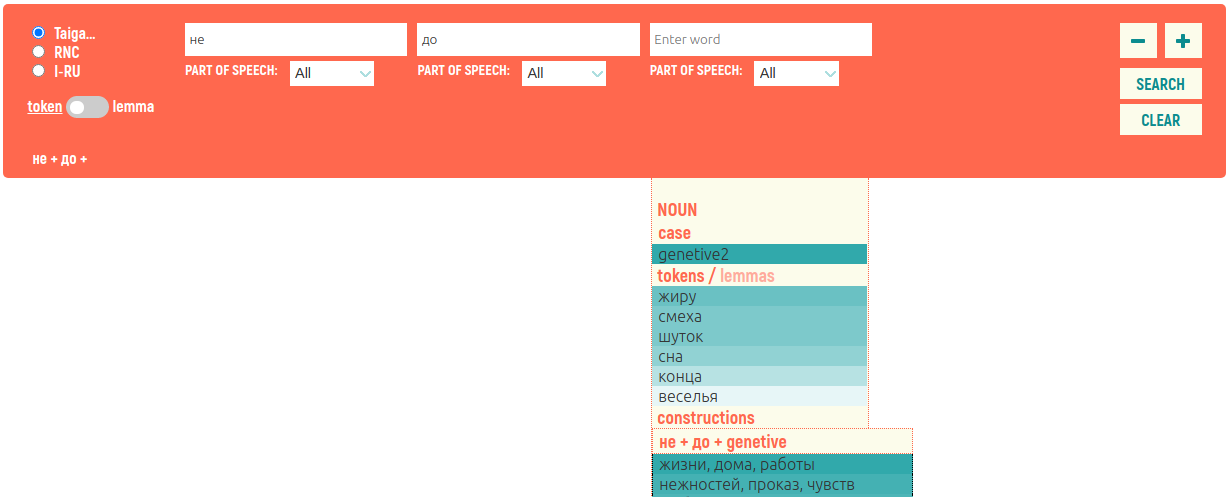Как использовать
Система позволяет найти возможные значения пропущенного компонента в цепочке двух или трёх слов.
- Для простого поиска введите слово в нужное поле, укажите часть речи искомого слова или же оставьте это поле пустым и нажмите
 . По умолчанию введённое слово считается токеном. Если вы хотите искать леммы, выберите соответствующую опцию
. По умолчанию введённое слово считается токеном. Если вы хотите искать леммы, выберите соответствующую опцию  . Обратите внимание, что в этом случае в поле ввода нужно вводить начальные формы, например: стол, идти, красивый.
. Обратите внимание, что в этом случае в поле ввода нужно вводить начальные формы, например: стол, идти, красивый. - Подождите, пока система рассчитает, какие слова и их грамматические особенности чаще всего встречаются вместе с заданным словом.
- Для того чтобы задать сочетание из двух слов и искать варианты третьего (например, не до Х), нажмите на
 , введите каждое слово в своём поле, как показано в примере ниже, и нажмите
, введите каждое слово в своём поле, как показано в примере ниже, и нажмите
 .
.

- При желании вы можете выбрать корпус, на основе которого производятся расчёты:
- НКРЯ — подкорпус со снятой омонимией объемом ок. 5 млн. слов (задан по умолчанию);
- I-Ru — автоматически размеченный интернет-корпус, объемом 140 млн. слов.
- Вы можете ограничить поиск морфологическими параметрами. Например:
- задать для известного слова часть речи (например, чтобы разграничить существительное и глагол печь);
- задать для искомого слова падеж (например, указать винительный падеж для слов после предлога в).
 справа от части речи.
справа от части речи.
Детальную информацию об особенностях разметки можно найти на сайтах разработчиков корпусов:
НКРЯ: http://www.ruscorpora.ru/en/corpora-morph.html
I-RU: http://smlc12.leeds.ac.uk/itweb/help/Russian_Language_Tutorial.pdf - В результатах поиска вы увидите не все возможные слова и морфологические параметры, а только самые существенные — именно на них и надо обратить внимание при изучении русского языка. Чаще всего список предлагаемых слов и их морфологических параметров можно легко расширить, однако мы показываем самые стабильные и частотные. Переключатель
 позволяет показывать в результатах списки устойчивых словоформ (например: рано + вставать/овдовела/встает) или лемм (рано + вставать/умереть/ложиться).
позволяет показывать в результатах списки устойчивых словоформ (например: рано + вставать/овдовела/встает) или лемм (рано + вставать/умереть/ложиться).
 . By default, the input is taken as a token. If you need to search for lemma, choose
. By default, the input is taken as a token. If you need to search for lemma, choose  . In this case the input should be a dictionary form, e.g. стол, идти, красивый.
. In this case the input should be a dictionary form, e.g. стол, идти, красивый.
 you can switch between the list of tokens (e.g., рано + вставать/овдовела/встает) and lemmas (рано + вставать/умереть/ложиться).
you can switch between the list of tokens (e.g., рано + вставать/овдовела/встает) and lemmas (рано + вставать/умереть/ложиться).